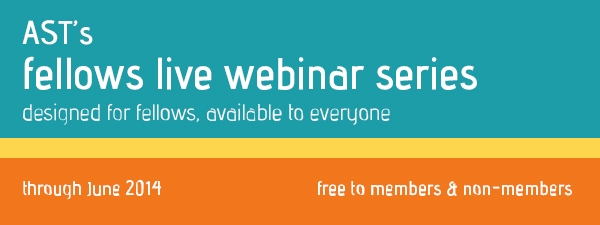Fellows Live Webinar Series

The AST Fellows Live Webinar Series is an educational program designed for fellows in transplantation, intended to complement the live AST Fellows Symposium program (September 2013). But attendance at that meeting is not required to participate in the webinars; in fact, anyone can participate in this FREE series. Pre-registration is required, and a registration link will be provided for each webinar as it becomes available.
Click here to view faculty disclosures of potential conflicts of interest relevant to this activity.
#1 Ethics in Transplantation
Originally aired: Thursday, December 5, 2013
Yolanda Becker, MD, FACS • University of Chicago School of Medicine
Moderated by: David Wojciechowski, DO • University of California, San Francisco
This is an interactive conversation about principles of ethics that affect organ allocation policies.
How do these principles impact decisions about scarce resources? What are possible unintended consequences? Will the new kidney allocation rules be a good or bad thing? Should a kidney always follow a liver?
#2 Pathology
Originally aired: Friday, February 21, 2014
Kidney:
Naima Carter-Monroe, MD, MHS • Johns Hopkins University School of Medicine
Lorraine Racusen, MD, FASN • Johns Hopkins University School of Medicine
Heart:
E. Rene Rodriguez, MD • Cardiovascular Pathology, The Cleveland Clinic
Liver:
Nitika Gupta, MD, DCH, DNB, MRCPCH • Emory University School of Medicine
Murli Krishna, MD • Mayo Clinic, Jacksonville
Explore cases in kidney, liver, and heart where the pathology indicated rejection, but where another diagnosis was ultimately identified.
#3 The Future of Translational Research in Transplantation
Originally aired: Thursday, March 20, 2014
Jamil Azzi, MD • Brigham and Women's Hospital, Harvard Medical School
Leonardo Riella, MD, PhD • Brigham and Women's Hospital, Harvard Medical School
Peter Heeger, MD • Icahn School of Medicine at Mount Sinai
Learning objectives:
- To define translational research
- To be able to explain 3 strengths and weaknesses of team science in transplantation
- To elucidate the requirements for performing laboratory studies using human samples obtained from clinical trials in so as to be able to make interpretable conclusions
- To be able to communicate a testable hypothesis relevant for clinical/translational research in transplantation
#4 Generic Immunosuppressants: Good Medicine or a Cheap Fix?
Originally aired: Thursday, April 10, 2014
Simon Tremblay, PharmD • University of Cincinnati College of Medicine
Rita Alloway, PharmD, FCCP • University of Cincinnati College of Medicine
There currently are more than 20 generic formulations of different immunosuppressant medications used in transplantation that are approved for use on the US market. Therefore, questions have been raised as to the safety and efficacy of generic substitution in the transplant community. The objective of the webinar is to provide an overview of the generic medication approval process and its applicability to immunosuppressants used in solid organ transplant. We will also discuss the safety and efficacy of generic conversion from brand and interchangeability of different generic immunosuppressants from both pharmacokinetic and clinical trial data.
#5 Should I Accept this Donor?
Originally aired: Wednesday, May 7, 2014
Nicole Theodoropoulos, MD • The Ohio State University
Michael Ison, MD, MS, FIDSA • Northwestern University Feinberg School of Medicine
Dorry Segev, MD, PhD • Johns Hopkins University
Additional Q&A Answered Offline
Learning objectives:
1. Explain donor characteristics that raise concern for increased risk of recent HIV, hepatitis B and/or hepatitis C infection
2. Explain how to approach donors with death from encephalitis of unknown etiology
3. Discuss clues to raise concern for other transmissible infections in donors and how to manage the recipient postoperatively when the organs are accepted
4. Discuss the risk-benefit of accepting vs discarding organs for certain donor-recipient scenarios
5. Explain how to manage recipients of organs from donors with bacteremia or other bacterial infections.
#6 Malignancies after Solid Organ Transplantation
Wednesday, June 4, 2014 • 2:00 - 3:00 pm ET
Manjushree Gautam, MD, MAS • Baylor All Saints Medical Center
John Gill, MD • St. Paul's Hospital
Exposure to immunosuppressive drugs increases the risk of malignancy in transplant recipients. The risk of malignancy varies by organ type, duration and intensity of immunosuppression, recipient age, and exposure to oncogenic viruses. Participants in this session will gain an understanding of the pathophysiology of malignancy in the transplant recipient and apply this knowledge to identify patients at high risk, develop preventative strategies to mitigate risk, ensure timely diagnosis and optimize the treatment of recipients with post transplant malignancy.
